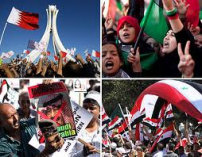As the Libyan people see renewed prospects for peace, subnational governance may represent an integral part of a resolution to protracted instability.
Perspectives on the Arab Spring

Over the past several years, I have been reflecting on the Arab Spring from the perspective of the international community’s response, its implications for international security, and the violent nature of most of the transition processes. These posts have become more broadly focused on the Middle East and (North) Africa and more irregular as time has passed…
Extremism must be a problem shared
We are witnessing more terrorist attacks that occur across more countries and kill more people (and, importantly, more Muslims than non-Muslims). It is pointless for world leaders to issue shared statements of condemnation while continuing to pursue otherwise nationally-centred responses to the problem.
Al-Qaeda: thinking local in regional turmoil spells trouble for the West
Al-Qaeda may not have regained the global threat potential that it posed a decade or so ago – at least, not yet. But its local and regional efforts have made it, in many cases, a powerful and entrenched source of instability. If left unchecked, such local and regional power can grow into something altogether more terrible.
Extremism must be a problem shared
We are witnessing more terrorist attacks that occur across more countries and kill more people (and, importantly, more Muslims than non-Muslims). It is pointless for world leaders to issue shared statements of condemnation while continuing to pursue otherwise nationally-centred responses to the problem.
Al-Qaeda: thinking local in regional turmoil spells trouble for the West
Al-Qaeda may not have regained the global threat potential that it posed a decade or so ago – at least, not yet. But its local and regional efforts have made it, in many cases, a powerful and entrenched source of instability. If left unchecked, such local and regional power can grow into something altogether more terrible.
Iran’s nuclear weapons deal will rebalance the Middle East
Signed by the P5 + Germany and mediated by the EU’s foreign policy chief, Baroness Catherine Ashton, the deal achieved with Iran on the latter’s nuclear programme has important implications for regional and international security dynamics that go well beyond nuclear weapons.
Recovery from the Arab Spring will take a generation or more
Predictions that may take a generation or more for the Middle East to recover from the turmoil that the Arab Spring are clearly a sobering assessment. But they are hardly surprising given that there has been no significant improvement in people’s living conditions, that political tensions and repression persist and that levels of violence are on the up.
Syria and the wider crisis of international diplomacy
What we see in Syria now illustrates the inability of global leaders to lead and offer strategic vision of engagement with each other that would enable a more constructive and pragmatic approach to problem-solving. Not only does this harm great power interests but with a look at the ever worsening humanitarian crisis in and around Syria it also makes a mockery of the values they purport to defend.
Commons vote on Syria is a first step in the right direction
Military action, limited or otherwise, is not the answer to the much more fundamental problems that the region faces and poses. It is likely not even part of that answer. The quicker we move beyond the narrow debate over military responses to a more comprehensive strategy, the better for Syria, the Arab Spring, and ultimately for us.
From Egypt to Syria, this could be the start of the Arab Winter
Within the countries of the Arab Spring, the forces unleashed by the sudden opening of political spaces were largely inexperienced, remain fearful and intolerant of each other, and were easily manipulated in regional and global proxy conflicts.
Tears and terror as Egypt slides towards civil war
The key challenge for the rival factions in Egypt is to learn the right lessons from its so-far disastrous post-Mubarak transition and find the courage to right the wrongs committed by both sides.
West has key role to play amid Yemen’s al-Qaeda resurgence
Western powers can and must play a key role in containing the threat posed by al-Qaeda, if only to to create the space in which local political, religious, civic, and business leaders can eradicate the fertile ground of regime illegitimacy from which al-Qaeda will otherwise, more likely than not, rise and rise again.
Egypt: where turmoil comes with the constitution
Military coups are not a means of democratic politics, but democratic politics in societies as deeply divided as Egypt may not be possible with the kind of exclusive institutions and uncompromising political leaders that the country currently has. Temporarily suspending the constitution is a stop-gap measure that can work in the short-term. What Egypt may also need in the long-term is a more inclusive set of political institutions and leaders that put the interests of the country as a whole above their own.
